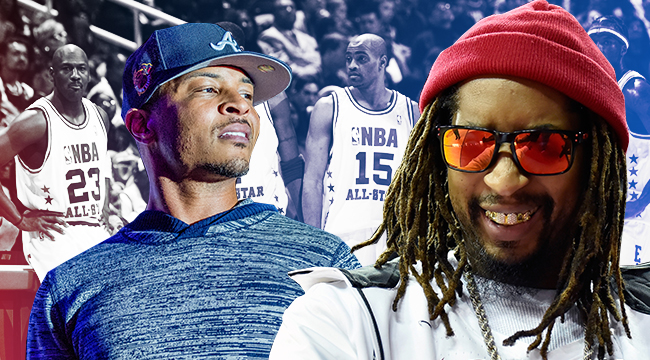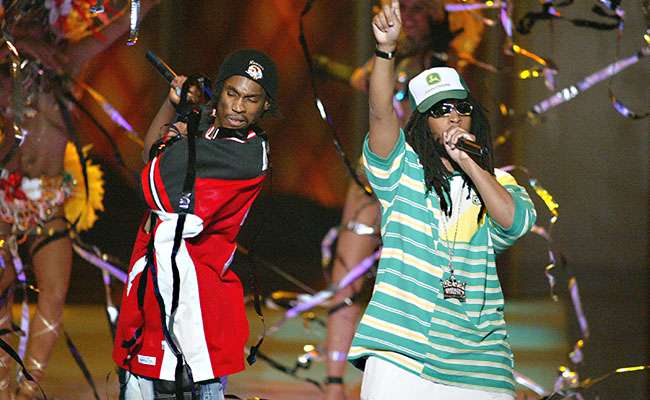
Cultural phenomena never truly come out of nowhere or pop up out of the ether without proper warning. There’s always some sort of grassroots movement that precedes the mainstream tidal wave that follows … unless, of course, the movement is manufactured in a boardroom, a la the Whip/Nae Nae. But this isn’t about that. No, this is about Hip-Hop, and a region that exploded onto the national scene to dominate rap culture for more than a decade.
And it all started thanks to an exhibition basketball game.
The 2003 NBA All-Star Weekend in Atlanta was one of the league’s most memorable showcases. Jason Richardson capped off Saturday’s Slam Dunk Competition with an insane alley-oop reverse between-the-leg dunk that’s still never really been duplicated. And the next night, for Michael Jordan’s final All-Star Game, the GOAT nailed a clutch fadeaway over the outstretched arms of elite defender Shawn Marion to send the game to double overtime. The West finally pulled away to a 155-145 final, however, behind Kevin Garnett’s 37 points and nine rebound MVP effort. Bonus: Mariah Carey’s halftime Wizards jersey-dress. Yes, Phillips Arena was rocking all weekend, but it was the cultural awakening happening outside of the stadium that left the most permanent lasting impact.
As is typical for most All-Star Weekend cities, Atlanta was booming with parties on almost every block and those parties attract DJs, record execs, and artists from all over the country. And what those movers and shakers heard in Atlanta was a musical movement that has always been revered regionally, and was begging to get national attention.
“The city was on fire,” remembers DJ and former A&R Wally Sparks, who came down to Atlanta from Tennessee for All-Star Weekend in 2003. “If Cash Money and No Limit were the foundation for southern rap dominance, then All-Star Weekend 2003 was the second coming that really solidified it.”
https://www.youtube.com/watch?v=ryIjCkw3Jfg
It’s important to remember that this was before social media and Soundcloud where artists can spread their music across the world with a simple URL link. In 2003, it was much harder for regional artists to break out. That’s why it was important for an event like All-Star Weekend to bring national ears to Atlanta’s music scene. And when those ears got to the city, they heard a new sound that was captivating an entire region. In particular two songs: Bone Crusher’s “Never Scared” featuring Killer Mike and a relatively unknown MC named T.I. and Mississippi-native David Banner’s “Like A Pimp,” featuring Houston’s Lil Flip.
“You couldn’t go anywhere in Atlanta without hearing those two songs as well as 50 Cent’s ‘In Da Club,’” Sparks recalls. “If you were a DJ and you didn’t have all three of those records, you were going to have a bad night. But ‘Never Scared’ really pushed the Atlanta sound forward.”
“Never Scared” is just loud as f*ck,” Sparks adds. “The song has a violent bass line and features Bone Crusher’s trademark booming voice yelling over the hook. Killer Mike and T.I. demolished their verses and the song was an elbow-the-person-closest-to-you banger. Here’s how big the song is. Two years ago at a Dungeon Family Reunion concert that featured a reunited Outkast and Goodie Mob, the loudest crowd reaction by a Cobb County mile was T.I. joining Killer Mike and Bone Crusher to perform “Never Scared.”
Speaking of Dungeon Family, it’s important to note that Atlanta had previously gotten national recognition with a few acts like Outkast and Ludacris making mainstream waves through the 90s and early 2000s, but All-Star Weekend opened the door for the entire city. The music was blaring in every club from Visions to 112 to Envy. Fans would hop in mosh pits and throw elbows, recite every single word and turn the demolish dance floors whenever their favorite ATL hits erupted through speakers.
Those clubs were also full of music execs, producers and A&Rs looking for the next big acts who saw those crowds lose their damn minds. And they found exactly what they were looking for. Lil Jon, who had regional hits like “Bia Biah” was churning out anthems faster than radio stations could spin them. The aforementioned T.I. and his Grand Hustle team were dominating the Atlanta underground scene. And even lesser-known names like Miracle and The Youngbloodz were making waves.
The DJs and execs from across the country would leave Atlanta with a new crop of music and hitmakers that they couldn’t wait to introduce to wider markets either to claim they broke the music first or get a sweet finder’s fee at a record label. Almost immediately, Atlanta music became a national staple. What resulted was a mad dash to the city to capitalize on the sound and take the music worldwide.

DJ Jaycee, who was DJing for Atlanta-bred MC Ludacris, noticed the change, and as he continued to tour the country with Ludacris, he’d hear more Atlanta everywhere.
“The previous two All-Star games were in D.C. and Philly,” Jaycee says, “and they were playing a lot of Bad Boy and Roc-A-Fella … lots of East Coast. But it changed after Atlanta. Like, I’d go to L.A. and hear DJ Felli Fel playing Banner or T.I.”
The ripple effects of the 2003 All-Star Weekend were immediate. T.I.’s debut Trap Muzik came out that August, debuting at No. 4 on the national Billboard charts. Lil Jon became a household name (thanks, in part to a timely Chappelle’s Show sketch). The next couple of years saw Atlanta bringing the “snap” dance movement nationwide thanks to Dem Franchize Boyz and D4L. Young Jeezy’s 2005 debut Let’s Get It: Thug Motivation 101 made him an undeniable force.
Atlanta never looked back, introducing new national superstars every few months from Gucci Mane to Fetty Wap to Waka Flocka and everyone in between.
It’s possible that Atlanta rap would have become the dominant force it is today without the 2003 All-Star Weekend. You know, cream rising to the top and all that. However, it’s undeniable that the weekend was the spark that ignited a musical movement and a platinum rush that sent tastemakers south.
While the greatest basketball player of all time was in Phillips Arena passing the torch to the next generation, the Atlanta rap scene was yanking the torch away from New York and the rest of the country. All thanks to a game that didn’t matter.






